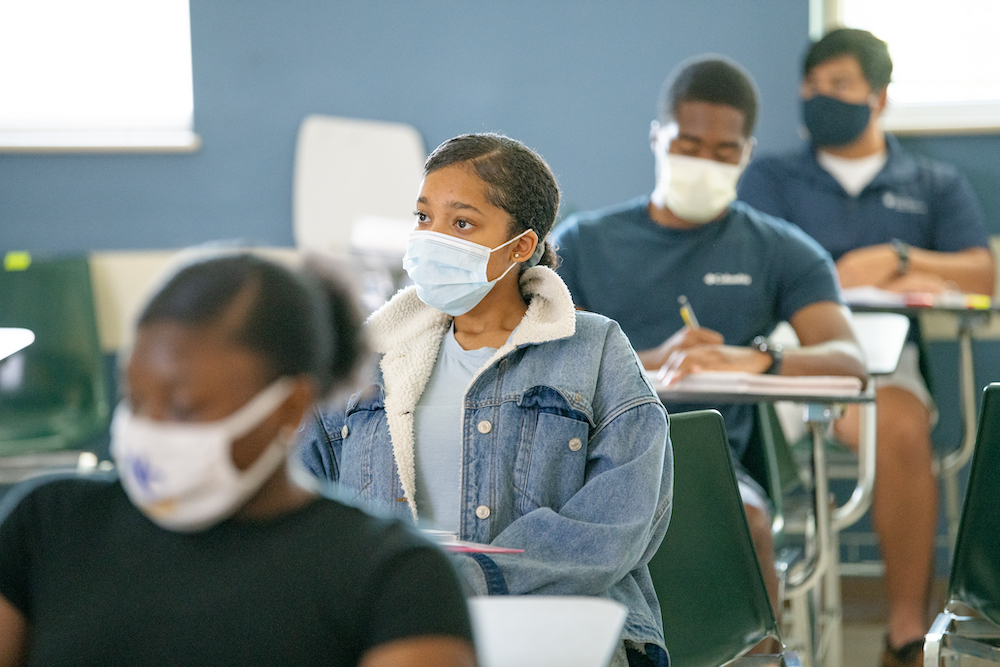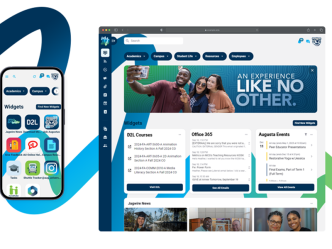Augusta University will use the latest federal COVID-19 relief funds to support student financial needs, upgrade classroom technology and offer faculty training.
Nearly $3.1 million granted by this year’s Coronavirus Response and Relief Supplemental Appropriations Act (CRRSA) assisted Augusta University students with demonstrated financial need. In early March, 5,739 students were awarded CRRSA Act grants ranging from $200 to $650, with eligibility determined by FAFSA. An additional 282 students applied for and received $53,671 in grants through the university’s COVID-19 Student Emergency Fund.
“There’s no question that college students have been among those most affected by the coronavirus pandemic,” said Dr. Neil MacKinnon, provost and executive vice president for academic affairs at Augusta University. “We know many Augusta University students have been faced with financial hardships over the past year, from job losses and child care challenges to technology and access issues for remote learning. While it’s heartbreaking to see anyone on campus struggle, we’re bolstered by the federal government’s support so our students can focus on their educational and career goals rather than financial worries.”
The university also received over $6.8 million through the most recent Coronavirus Aid, Relief, and Economic Security (CARES) Act Institutional Aid and will apply $3.9 million toward technology upgrades and training this summer. A complimentary plan for the remaining funds will be released at a later date.
As part of Augusta University’s continued response to the COVID-19 pandemic, classroom technology upgrades in University Hall and the Maxwell Theatre will support the faculty’s ability to teach at a distance. Audiovisual tools in classrooms will be upgraded to provide lecture capture and video conferencing capabilities. Technology-enhanced classrooms will allow faculty to record and distribute lectures, participate in web and video conferencing classes and effectively communicate remotely with students when necessary to promote health and safety guidelines.
“Ensuring continuity of instruction is a key priority for our students’ success,” said Dr. Zach Kelehear, Vice Provost for Instruction at Augusta University. “While we are planning for fully in-person instruction this fall, these technology upgrades will simultaneously augment in-person instructional capacities as well as provide the flexibility our instructional faculty members need for hybrid instruction as we continue to uphold the latest safety guidelines and prevent the spread of COVID-19.”
Beginning after May graduation, the Center for Instructional Innovation, in partnership with Information Technology, will provide an instructional academy open to all full- and part-time instructional faculty. The design team will offer three different subject matter tracts, each six weeks in duration. The training will be offered via D2L and Microsoft Teams. While all instructional faculty are invited to participate, ten-month faculty are eligible for compensation for this off-contract work.
Instructional Academy topics will include:
- Humanizing Instruction, which focuses on the human side of teaching and provides faculty with the opportunity to learn, discuss and reflect on topics such as teaching with empathy, inclusive teaching and design thinking in both remote and in-person environments.
- Multimedia and Motivation in Student Learning, which is grounded in cognitive and motivation science and focuses on creating and implementing multimedia and game elements into both a remote and in-person environment learning process.
- Technology Enhanced Course Design and Delivery, which builds upon the lessons learned from pandemic teaching and moves faculty from ad hoc technology assisted instruction to designing and delivering “flexible multimodal” courses in a manner consistent with national quality standards.
Additional technology upgrades will include mobile charging stations in student collaborative spaces, Azure Cloud Authentication to support mobile instruction and the replacement of over 450 outdated faculty computers with laptops.
Decisions about how to appropriate the federal funds were made by a university finance committee composed of a diverse representation of faculty, staff and administration, and ultimately guided by the university’s strategic priorities.
Augusta University received nearly $6.2 million in CARES Act funding in spring 2020, which was applied to student grants and refunds, as well as technology upgrades for classrooms, Wi-Fi hotspots and laptops for student use.
“We’re grateful for the federal support of higher education as we navigate the needs of our faculty and students during this unprecedented year,” Kelehear said. “Jaguar Nation has proven to be adaptable and resilient, but these upgrades and training opportunities will put us in position to tackle any new challenges that come our way in the future.”
 Augusta University
Augusta University




